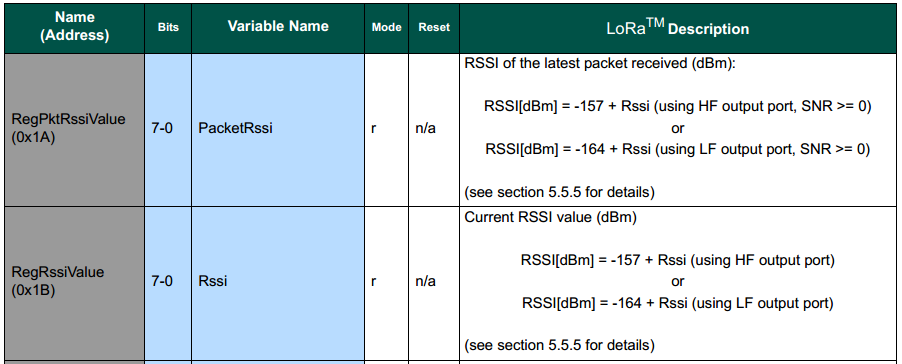LoRa笔记01 sx1276 sx1278信号强度RSSI研究
1 前言
RSSI信号强度是无线网络中特别被人关注的一个点,尤其是工程部署中。今天在了解LoRa SX1276的RSSI展示,搜寻了一些资料,做如下笔记留念。(留念。。。真没词用了吗。。。)
本文作者twowinter,转载请注明作者:http://blog.csdn.net/iotisan/
2 官方资料
涉及寄存器

官方英文说明
5.5.5. RSSI and SNR in LoRaTM Mode
The RSSI values reported by the LoRaTM modem differ from those expressed by the FSK/OOK modem. The following
formula shows the method used to interpret the LoRaTM RSSI values:
RSSI (dBm) = -157 + Rssi, (when using the High Frequency (HF) port)
or
RSSI (dBm) = -164 + Rssi, (when using the Low Frequency (LF) port)
The same formula can be re-used to evaluate the signal strength of the received packet:
Packet Strength (dBm) = -157 + Rssi, (when using the High Frequency (HF) port)
or
Packet Strength (dBm) = -164 + Rssi, (when using the Low Frequency (LF) port)
Due to the nature of the LoRa modulation, it is possible to receive packets below the noise floor. In this situation, the SNR
is used in conjunction of the PacketRssi to compute the signal strength of the received packet:
Packet Strength (dBm) = -157 + PacketRssi + PacketSnr * 0.25 (when using the HF port and SNR < 0)
or
Packet Strength (dBm) = -164 + PacketRssi + PacketSnr * 0.25 (when using the LF port and SNR < 0)
Note:
1. PacketRssi (in RegPktRssiValue), is an averaged version of Rssi (in RegRssiValue). Rssi can be read at any time
(during packet reception or not), and should be averaged to give more precise results.
2. The constants, -157 and -164, may vary with the front-end setup of the SX1276/77/78/79 (LnaBoost =1 or 0,
presence of an external LNA, mismatch at the LNA input…). It is recommended to adjust these values with a single-point
calibration procedure to increase RSSI accuracy.
3. As signal strength increases (RSSI>-100dBm), the linearity of PacketRssi is not guaranteed and results will diverge
from the ideal 1dB/dB ideal curve. When very good RSSI precision is required over the whole dynamic range of the
receiver, two options are proposed:
- Rssi in RegRssiValue offers better linearity. Rssi can be sampled during the reception of the payload (between
ValidHeader and RxDone IRQ), and used to extract a more high-signal RSSI measurement
- When SNR>=0, the standard formula can be adjusted to correct the slope:
RSSI = -157+16/15 * PacketRssi (or RSSI = -164+16/15 * PacketRssi)
中文解读
常规情况下,公式是这样:
RSSI (dBm) = -157 + Rssi, (高频口)
RSSI (dBm) = -164 + Rssi, (低频口)
另外在SNR<0的噪声环境下,要按照Packet Strength (dBm) = -157 + PacketRssi + PacketSnr * 0.25 (或者低频时,Packet Strength (dBm) = -164 + PacketRssi + PacketSnr * 0.25)这样的公式。
1.PktRssiValue指单个包的信号强度,是收包这段时间内的RSSI的平均值。RssiValue指当前的信号强度。
2.如果有加外部LNA,那需要做单点校准,让RSSI显示更准确。
3.当信号强度超过-100dBm之后,PacketRssi就不能保证线性,结果会偏离 1dB/dB 的曲线。因此需要做一定的校正。当SNR>0时,可以参考如下公式:RSSI = -157+16/15 * PacketRssi (or RSSI = -164+16/15 * PacketRssi)。当然SNR<0时,还要注意同样做噪声干扰的校正,在公式后面 + PacketSnr * 0.25 。
3 代码分析
代码中处理信号强度是这样,判断频段是否大于550MHz,据此来进行高频和低频的不同偏移量的处理。
int16_t SX1276ReadRssi( RadioModems_t modem )
{
int16_t rssi = 0;
switch( modem )
{
case MODEM_FSK:
rssi = -( SX1276Read( REG_RSSIVALUE ) >> 1 );
break;
case MODEM_LORA:
if( SX1276.Settings.Channel > RF_MID_BAND_THRESH )
{
rssi = RSSI_OFFSET_HF + SX1276Read( REG_LR_RSSIVALUE );
}
else
{
rssi = RSSI_OFFSET_LF + SX1276Read( REG_LR_RSSIVALUE );
}
break;
default:
rssi = -1;
break;
}
return rssi;
}
4 范例
假如我们收到这样的信号值:
rssi cur: 61,snr: 35
pkt rssi:113
因为测试频段是433MHz,且SNR>0,因此使用如下公式:
RSSI = -164+16/15 * PacketRssi = -164 + 16/15 * 113 = -43.467

您的留言或需求: